Six Continents, Six Stories
Welcome to Magic Around the World Week! This week we're going to be talking all about Magic as it's played around the globe. One of the things I love about my job is the opportunity it provides me to travel. In my twenty years so far, Magic has gotten me to every continent save Antarctica, so for today's column I've decided to share six stories with you, one from each continent.
My first two stories involve the two sickest players I've ever seen compete in the finals of a high profile event. Interestingly, the two players are good friends and played for many years on the same team.
Story #1 — A Sick Finals (a story from South America)
The second-ever Duelist Invitational (years later it would be renamed the Magic Invitational) was held in Rio de Janeiro, Brazil. It was held in conjunction with a Grand Prix and both events were hosted in an old, historic building. The Grand Prix was held upstairs in a large hall. It was the middle of the summer in Brazil and the temperature was over 100 degrees Fahrenheit (38 degrees Celsius) the entire trip. There was not great ventilation in the upstairs hall and it was filled to capacity by players. The one time I went up, it felt like the event was being held in a steam room.
Meanwhile, we were downstairs in a glass room, which was the only room in the building with air conditioning. Spectators would have their faces pressed up against the glass watching. At the time, I thought there were just excited to watch the event, but I now realize the glass was also probably very cool. Anyway, the Brazilian players were very excited to be hosting the event and treated the Invitational players like rock stars.
Fifteen players duked it out over three days (fifteen because one of them, Jason Zila, had cancelled at the last minute and we were not able to replace him—we kept his name in the pairings and playing Zila meant you had the "bye") and in the end two players were left—Jakub Slemr from the Czech Republic and Darwin Kastle from the United States. Jakub Slemr was, at the time, the reigning World Champion. Darwin Kastle was a player with numerous Pro Tour Top 8 finishes, including a second-place finish at PT Atlanta, the fifth-ever Pro Tour. Kastle would go on to become an inaugural inductee into the Pro Tour Hall of Fame.
The way the finals of the Invitational worked back then is that the two finalists played each of the five formats (for those unaware, the Invitational was a fifteen-round Round Robin tournament—each player plays each other player once—where the format changes each three rounds). As each format was played two-out-of-three, this meant that the finals have the potential to take a while. I know from the previous day that Darwin was a little under the weather but overnight it had gotten worse. Darwin was very sick. Nonetheless he showed up for the finals because he badly wanted to win and he wasn't about to let anything, including a raging virus, stop him.
When I say Darwin was sick, I'm not talking about some sneezing or excess coughing. Darwin was on the verge of collapsing. I was actually surprised he managed to make it out of bed and to the finals. The problem was everyone (well…except me, I was hanging around with my girlfriend for a vacation afterwards—you can read more on that in my column about our courtship) was leaving town the next day, so the finals couldn't be delayed. Although everything else pointed to the contrary, Darwin said he was able to play.
At some point during the first format, Darwin turns to me and says, "Are we allowed to take breaks during play?" I asked him what he meant by that and he said, "I think I have to throw up." I sent him off to the bathroom. Darwin would repeatedly excuse himself, but he would always return focused on playing. The finals went to the fifth format and Darwin, through sheer force of will, managed to win three of the five formats to win the event. Darwin handed me his card (what would go on to become Avalanche Riders) that he wanted for his prize and then went straight to bed, where I think he slept until he had to get up the next day to fly home.
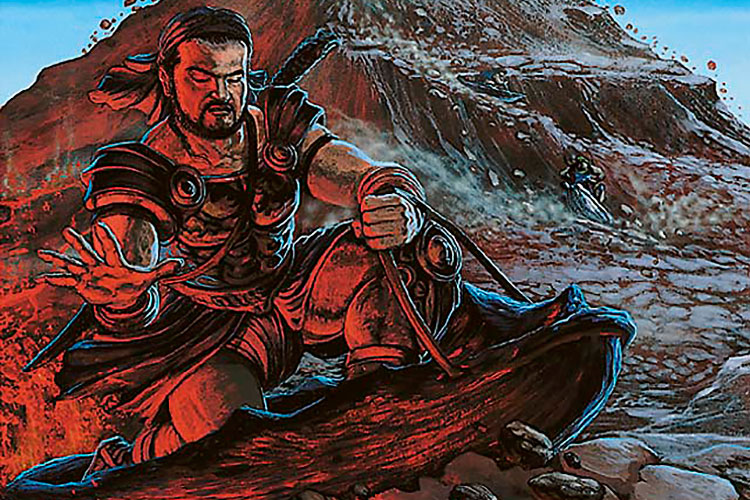
Avalanche Rider | Art by Edward P. Beard, Jr.
Story #2 — Another Sick Finals (a story from North America)
The second story of a sick player playing in a finals, interestingly, also includes Darwin Kastle although this time he wasn't the one that was sick. Instead, that honor belonged to another future Hall-of-Famer, Rob Dougherty. The event was Pro Tour Washington, DC—the very first team Pro Tour. Dougherty, along with Kastle and yet another future Hall-of-Famer, Dave Humpherys, made up Team Your Move Games. The team was named after the game store owned by Dougherty, where all three played. The three faced off in the finals against Team Game Empire, made up of three Americans: Kurt Burgner, former World Champion Brian Selden, and future Hall of Famer Alan Comer.
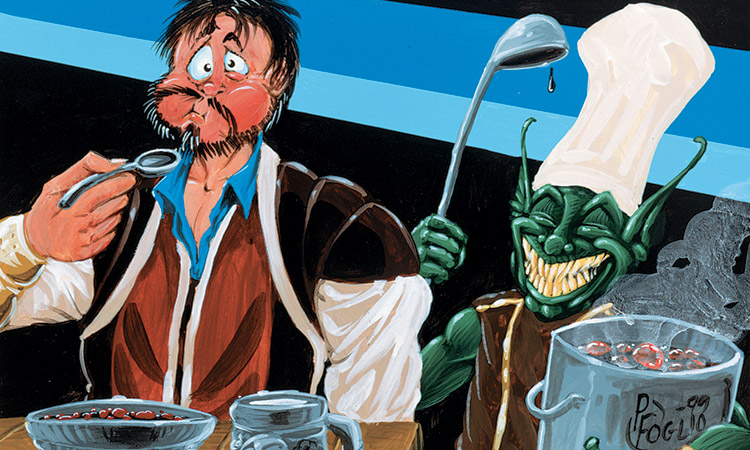
Recycle | Art by Phil Foglio
I'm not 100% sure how Dougherty got sick. A number of players got food poisoning that weekend, so my best guess is that's what happened to Dougherty. But it's possible he picked up a virus. I do know he was well for the most of the weekend, so I lean toward food poisoning. Regardless of why, come Sunday Dougherty was sick as a dog. The event was Team Rochester Draft using Urza's Saga block—which meant that the three players drafted together and could help one another make their picks. Rob managed to participate in the draft, but Kastle and Humpherys were doing all the strategizing, helping Dougherty with his draft.
During deck construction, Dougherty laid on the floor. A judge registered his deck and Kastle and Humpherys built it. Dougherty, though, had to actually play the match in the finals. Dougherty had drafted a red-green deck and was paired up against Brian Selden, who was playing a green-white deck. The green-white deck traditionally had the advantage in the match-up, but Dougherty had been able to draft both Lightning Dragon and Molten Hydra, which gave him an advantage.
Because this was a team tournament, it was possible for Team Your Moves Games to win even if Dougherty lost, but he was not about to sit out the finals. In the end, Dougherty defeated Selden and was the first match completed. Dougherty then watched as Humpherys won his match (the audience, by the way, was watching Kastle's match because I wasn't allowed to hold Humpherys's match versus Alan Comer) and clinched the victory for Team Your Move Games.
Story #3 — A Format is Born (a story from Africa)
Rotisserie Drafts have become all the rage recently, so I thought it might be fun to tell the story of how the format was created. When I created the Magic Invitational, one of the things I was interested in was using the event to show off cool and quirky formats to the world. Many of the formats were pre-existing formats, but I also had some fun making a few up. Rotisserie Draft is one such format.
The event was the Magic Invitational held in Cape Town, South Africa. Each Invitational had five formats. Here was the structure I used:
1) A normal Constructed format
The idea was that one of the Constructed formats was one that people normally played so that we could introduce new decklists. For Cape Town, that format was Standard because at the time we didn't play Standard at any of the Pro Tours other than Worlds.
2) A quirky Constructed format
This format would require the players to have to think a little differently than normal. Usually, I made up a brand new format for this slot, but a Casual format called 5-Color (kind of the predecessor of Commander) was popular at the time, so we decided to use that.
3) A Constructed format that required no deck building
We liked having three Constructed formats, but didn't want to burden the players with having to make three different decks, so one format was designed to be Constructed, but we would build the decks. This slot ended up being the Auction of the ________ format for many years. Seventeen decks would be selected, often built by the audience, and the Invitational players would then bid the starting life and hand size for them. In Cape Town, it was the first Auction of the People, and the audience designed decks built around a specific creature type.
4) Duplicate Limited
Up until the Invitational moved online, this format was played at every Invitational. It is a Sealed format where all sixteen players get an identical card pool specifically designed for the event. For most of the Invitationals, including Cape Town, I designed it.
5) A skill-testing Limited format
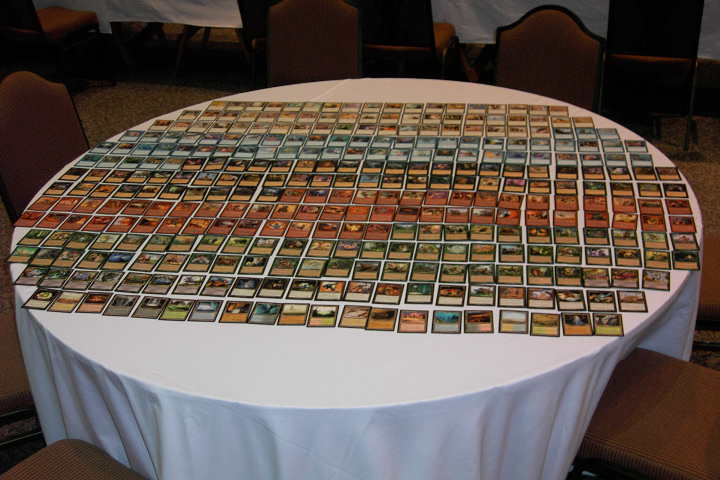
Sometimes, this was a straightforward Limited format like Booster Draft or Rochester Draft. But I also used this slot to do things like run less-used Limited formats that demanded a great deal of skill, like Solomon Draft. But because we were playing 5-Color, there wasn't a new format being played at the event and I liked each Invitational to premiere at least one new format.
The task put before me was to find a new Limited format that tested the competitors' skill. In addition, Odyssey had recently come out and I wanted to make sure the format could show off the new set. One of the things I tend to do when brainstorming is to suggest extremes. One idea I wrote down was "draft the entire set." Usually, you write down extremes because it can prod you into new ways of thinking about the problem, and lead you to solutions you might not have thought of. But as I looked back at the suggestion, it started growing on me. Why not just draft everything? I liked the novelty of it and the fact that it would test their skill quite strenuously. I broke the group of sixteen into two pods of eight and determined the seeding based on standing in the tournament at the time. I used Rochester Draft's snaking pattern as the method of drafting, and I was done.
All that was left was to name the format. My goal in making up new formats was to get other players to try them, so I knew the name was important. I started looking around at draft formats in other games and stumbled across Rotisserie Baseball Drafts. It was similar in that you could draft from the entire pool, so I borrowed the name. For those that were curious, the name "Rotisserie" comes from the name of the restaurant, La Rotisserie Française, where the originators of the draft used to meet for lunch and first played the game. Also, this means that Magic's Rotisserie Draft was actually not inspired by the baseball draft as I had never played it. The format was well received at the time, but it didn't pick up steam until over a decade later.
Story #4 — Finkel's Best Draft (a story from Australia/Oceania)
I explained that Cape Town had the first-ever Auction of the People, but that wasn't the first Auction of the ___________ event held at an Invitational. I introduced format the year before at the Invitational in Sydney, Australia, with an event called The Auction of Champions. At the time there had been seventeen winning Pro Tour and/or Worlds constructed decks that the players got to draft. Here they are:
- Zak Dolan (World Championships '94)
- Alexander Blumke (World Championships '95)
- Michael Loconto (Pro Tour New York '96)
- Olle Rade (Pro Tour Columbus '96)
- Tom Chanpheng (World Championships '97)
- Paul McCabe (Pro Tour Dallas '96)
- Michael Long (Pro Tour Paris '97)
- Jakub Slemr (World Championships '97)
- Randy Buehler (Pro Tour Chicago '97)
- David Price (Pro Tour Los Angeles '98)
- Brian Selden (World Championships '98)
- Tommi Hovi (Pro Tour Rome '98)
- Casey McCarrell (Pro Tour New York '99)
- Kai Budde (World Championships '99)
- Bob Maher, Jr. (Pro Tour Chicago '99)
- Sigurd Eskeland (Pro Tour New York '00)
- Jon Finkel (World Championships '00)
Once again, the way you bid for a deck was bidding starting hand size and then starting life total. Hand size trumped life total so a bid of 6 cards – 20 life was lower than a bid of 7 cards – 1 life. The best deck in the field was considered to be Tommi Hovi's PT Rome-winning deck. But the trick to the format was not just getting a good deck, but at a good bid.
Jon Finkel had done a lot of preparation for this format and was well versed in all the decks and how they matched up against one another. He was very active in most of the bids and actively bid on numerous decks, but always bowed out before they were taken. When it came to Finkel's turn to nominate a deck, he chose Zak Dolan's deck from the very first Worlds. Finkel got the deck for a high bid of 7 cards – 15 life.
The deck had the reputation of being a weird deck with odd one-ofs like Siren's Call and Ley Druid, but Finkel realized something that few others caught onto. Yes, it was a quirkily built deck but 1) it was a Vintage deck with access to very powerful cards and 2) as Finkel said "all the janky cards work well together." The decklist is easy to laugh at, but Zak Dolan's deck actually worked much better than people gave it credit for.
Finkel did well in the format, going 3-0. But the true testament of the deck was in the finals, when Finkel squared off against another future Hall-of-Famer, Ben Rubin. Rubin had purchased Dave Price's all-Tempest mono-red deck from the 1998 Pro Tour Los Angeles. He got it with a bid of 7 cards – 13 life; meaning he took it at a bid lower than Finkel got Dolan's deck.
The very first format played in the finals was Auction of Champions. In the first game, Finkel went first. Using a Mox Emerald and a Black Lotus, he played a turn-one Serra Angel. Rubin then figured out that with a perfect draw, his deck could destroy it on turn four. Suffice to say, the match-up wasn't close, and Finkel went undefeated piloting Dolan's deck. He would then go on to win the whole event. His prize would be Shadowmage Infiltrator.
Story #5 — The True Battle for Mirrodin (a story from Asia)
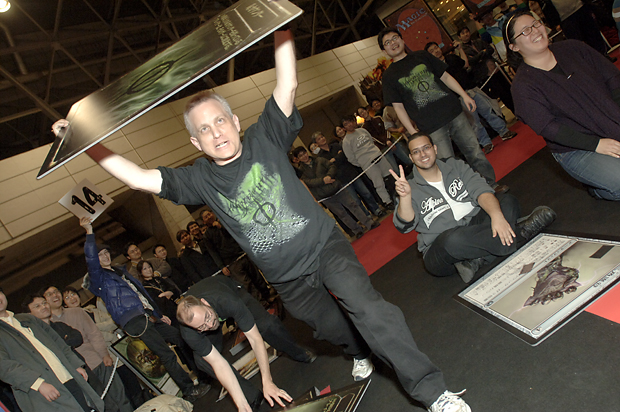
This next story took place at the 2010 World Championships in Chiba, Japan. I could talk about the Guillaume-on-Guillaume final match. I could talk about how, for the first time ever, the Pro Player of the Year was a tie. But my favorite story from this event wasn't even part of the World Championships itself. It was a promotional event I participated in one evening.
You see, often at big events, we do something we call Massive Magic where we play a game with giant three-foot tall Magic cards. Usually the players are two Wizards people, and we involve the audience during the game play. In this match-up I was playing for Team Phyrexia versus Richard Garfield, representing Team Mirran. Note that this happened in December, after Scars of Mirrodin had come out but before Mirrodin Besieged (in fact, each deck had a preview card from Mirrodin Besieged that we previewed at the event).
As we drew each card, we would pick a volunteer from the audience, who would manage that card (meaning they were responsible for any action it did from tapping to attacking). As this was all going on, there were two others people doing commentary on the match (mostly in Japanese, as we were in Japan). It is customary in this format for a lot of trash talking to occur. Add to this the flavor of the Phyrexian/Mirran war, and things got playfully heated.
I and my Phyrexian horde managed to get an early lead. The Mirrans made a comeback, but I quickly turned the tide back to the Phyrexian's favor. As it looked like the Mirrans were going to lose, Richard came over to my side, revealing that he was a double agent. The judges then made some very questionable rulings (it was clear to me there was some favoritism at play), allowing the Mirrans to even up the game. Richard then revealed he was in fact a triple-agent and went back to leading the Mirran side.
I never gave up hope and, despite playing against Richard and all the judges, Phyrexia was victorious. I handed Richard his tenth and final giant Japanese poison counter (which I brought home and have up near my desk) and won the game. I ended the match by saying "All is one. Phyrexia is coming." No one understood at the time that I was clearly signaling that Phyrexia was going to win the war later in the year.
The event was amazingly fun and is my favorite memory of the whole Worlds.
Story #6 — The Long Shuffle (a story from Europe)
The very first Pro Tour held in Europe was Pro Tour Paris, the event Mike Long would go on to win with his Prosperous Bloom combo deck. Today's story involves Long, but it happened before the finals (where he played a series of games against Mark Justice). No, today's story happened during the quarter-final match. Back in the day, I was the producer for the finals, meaning it was my job to figure out which match we were putting on-camera. For the quarter finals, I knew which match we were going to start with—American Mike Long was going to take on fellow American Jason Gordon.
The reason this match was interesting is that both Long and Gordon had very shady reputations, and many players enjoyed speculating which of the two was the shadiest. Sometimes you have two heroes face off against one another, and sometimes you have two villains. This was clearly the latter. Players loved rooting against the villains, so we often put them on-camera. Having two villains play each other, though, created a sweet tension as players had to figure out who to root for.
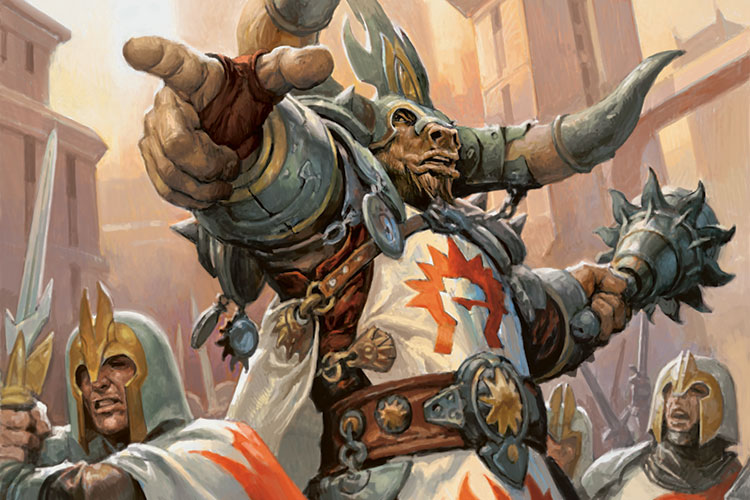
Boros Battleshaper | Art by Zoltan Boros
The way the set-up worked back in the day was: I was in my booth along with my commentators. I had a direct line to the director and I would explain to him where we were starting, and then where we would move when we needed to go to another match. We started on Long and Gordon. They were intensely shuffling, as neither trusted the other. It became clear that this shuffling was going to take a while, so I decided to move to another of the quarter-final matches.
After each game completed, I would check in on the Long/Gordon match. Still shuffling. The quarter-final match I was showing finished…and as Long and Gordon still weren't ready, I went to a second match. That match finished as well…so I checked back in. There was some argument about the shuffling, and the head judge had stepped in. I went to the third quarter-final match. It finished. I came back to the Long/Gordon match to discover, okay, they were ready to play.
Around the World in 3,000 Words
And with that, my tales from around the globe come to an end. I hope you enjoyed getting a little peek at Magic played across every continent save the icy one. As always, I'm eager for feedback. Do you enjoy articles like this with a bunch of smaller stories? Yes or no, please let me know either through my email or on any of my social media (Twitter, Tumblr, Google+, and Instagram).
Join me next week as I go way, way back.
Until then, may you have the joy of traveling across the world and picking up your own stories.
"Drive to Work #228—Legendary"
This podcast is about the creature type Legend that came to the big city and became the super type Legendary.
"Drive to Work #229—Dark Ascension, Part 1"
This podcast is part 1 of a 4-part series on the design of Dark Ascension.
- Episode 229 Dark Ascension, Part 1 (16.0 MB)
- Episode 228 Legendary (13.7 MB)
- Episode 227 2009 (14.6 MB)
- Episode 226 Inertia (18.2 MB)
- Episode 225 White-Black (15.5 MB)
- Complete Drive To Work Podcast Archive

